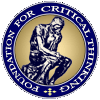 NEWSLETTER
NEWSLETTERCritical Thinking in the News... sdfgsdfgsdfg Surry Community College recently received recognition as one of 120 community colleges nationwide to be declared eligible for the new Aspen Prize for Community College Excellence. It comes with a one million dollar award. Surry CC made it to this first round of 120 schools for their completion rates and outstanding academic and workforce outcomes. The college was one of three NC community colleges in the field of 120. Surry CC is currently completing the round two application--the Aspen Institute will select 10 colleges for round two. Surry is stressing in their materials the crucial role that the learning philosophy and critical thinking have played and continue to play in their students' success. Their overall point is that they succeed by holding students to rigorous standards that require them to think critically--while at the same time they balance that rigor with student services that provide academic support focused on helping students think through the material. Congratulations to Surry for their commitment to infusing critical thinking across the curriculum, as is evidenced in recognition by the Aspen Prize for Community College Excellence. Surry Community College is listed as one of the Institutions Using Our Approach to Critical Thinking. ______________________________________________ CT 700 For Those Who Teach Online Course Registration is Open! Register now for the fall online course in critical thinking, for those who teach. Click here to read more. | announcing spring 31st International Conference on Critical Thinking July 25-28, 2011 Preconference July 23-24 Claremont Hotel in Berkeley, CA* Register by July 4th for the Early Registration Rates. We offer group rate discounts for 2 or more. Click here for registration and rate information. *Book your room at the Claremont by July 4th to receive our special rate of $159/ night, $5 parking, restaurant discounts and complimentary use of the spa facilities.  Sessions incude:
For a conference brochure click here. For complete information on sessions, presenters, early registration rates and the workshop hotel, please click here. |
Fostering Critical Thinking in the Classroom… Teach students how to assess their listening. Since students spend a good deal of their time listening, and since developing critical listening skills is difficult to achieve, it instructors should design instruction that fosters critical listening. This is best done by holding students responsible for their “listening” in the classroom. Here are some structures that help students develop critical listening abilities:
or (b) put them in groups of two with each person trying to answer the question of the other. Through activities such as these students learn to monitor their listening, determining when they are and when they are not following what is being said. This should lead to their asking pointed questions. Reward students for asking questions when they do not understand what is being said. | |
Quotable Critical Thinking Quotes... In his book, Portraits from Memory, "Reflections on My Eightieth Birthday," Russell (1956) comments on the long term nature of change and the importance of moving ever closer toward the creation of critical societies: ...beneath all this load of failure I am still conscious of something that I feel to be victory. I may have conceived theoretical truth wrongly, but I was not wrong in thinking that there is such a thing, and that it deserves our allegiance. I may have thought the road to a world of free and happy human beings shorter than it is proving to be, but I was not wrong in thinking that such a world is possible, and that it is worth while to live with a view to bringing it nearer. I have lived in the pursuit of a vision, both personal and social. Personal: to care for what is noble, for what is beautiful, for what is gentle; to allow moments of insight to give wisdom at more mundane times. Social: to see in imagination the society that is to be created, where individuals grow freely, and where hate and greed and envy die because there is nothing to nourish them. These things I believe, and the world, for all its horrors, has left me unshaken. Bertrand Russell, Portraits from Memory, "Reflections on My Eightieth Birthday," 1956 | |